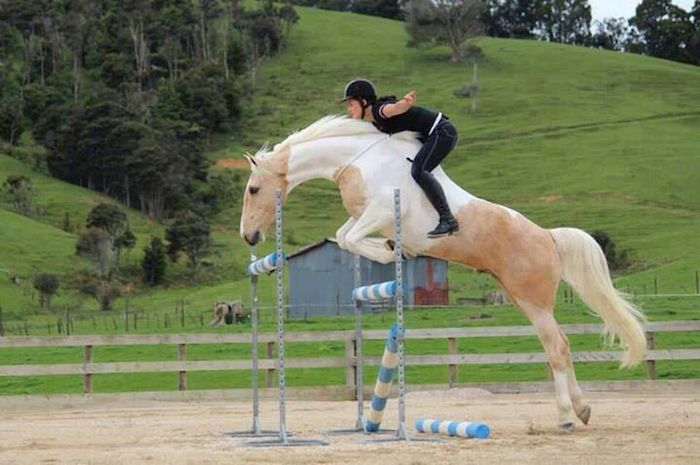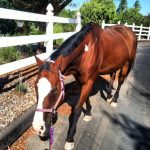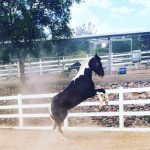Do Horses Like When We Ride Them?
It’s an age-old question all horseback riders have wondered a time or two: do horses like to be ridden?
Good equestrians don’t just enjoy riding horses, they also truly love and care about the wellbeing of the animal. Therefore, we can only hope that horses don’t hate being ridden. I sure hope my horse doesn’t see me coming with the saddle and think, “Oh no, oh no, oh no!” But I have met a number of horses who have this hoof-jerk reaction to the very sight of riding tack.
Then, there are other horses that can be ridden bareback, with no bridle over large fences with ease and grace. Instantly the incredibly talented and gentle rider Alycia Burton comes to mind. It’s clear watching the body language of her horse that he is enjoying himself and at ease.

Alycia Burton jumping her horse bareback and without a bridle. Photo Credit: freeridingnz
So, what makes a horse content under saddle?
- A gentle rider with soft aids
- Clear communication between horse and rider
- Comfortable tack that is properly fit and doesn’t pinch, pull, or restrict movement in any way
- Working to the horse’s skill level and not pushing them too far
- Good fit between horse and rider; rider is appropriately sized for the horse
What makes a horse unhappy under saddle?
- A rough or aggressive rider
- Riders who don’t understand the right aids to use will only confuse their horse and then if the rider starts punishing the horse for not responding correctly, well the horse is confused and clearly not having fun
- The rider is too big for the horse
- Not respecting or praising the horse enough
- Riding a horse that is hurt, injured or in pain
Sure, most horses would rather be out playing in a pasture or munching on some hay than working hard in the arena. At the same time, I’d rather be snuggled up on my couch with a cup of hot cocoa watching Netflix, but I still have to go to work every day. The time we spend working hard makes relaxing that much more enjoyable. I like to think of it as sort of like that for horses too. Of course, if my work life entailed being beat with a whip, excessively yelled at with no praise at all, I’d probably want to quit my job – or buck off my boss.
What I’m trying to say is, horses don’t have to hate being ridden. They can find some level of enjoyment in the sport, but that all depends on the skill and patience of the rider, as well as the respect they have for the horse. When the right partnership forms, horses and humans can make great friends who have worlds of fun together. This friendship is further expanded when sharing the magic of galloping together as one.
Does it Hurt Horses to Ride Them?
Horses are big and strong and perfectly capable of carrying us humans around. It should not hurt a horse to ride them, as long as you follow these rules:
- The rider should not be too big for the horse, a heavy rider on a small horse can put too much pressure on the horse’s back, leading to discomfort and even health issues.
- Horse is sound and does not have any existing injuries, this includes a clean saddle area with no sores. If there are sores underneath a horse’s tack it can be rather painful and lead to infection.
- Respect the horse’s physical condition and do not push him or her past what they are comfortably capable of.
- Do not pull on their mouth, use a gentle bit or a bitless bridle (hackamore bridle)
- Don’t wear spurs unless you have excellent control of your leg. Refrain from kicking hard with spurs or constantly digging into their sides with spurs. This can be nearly impossible to accomplish if you are not a strong and skilled rider with good leg control.
- Be kind with whips and other riding tools, refrain from using as much as possible.
- Don’t bounce around too much, try and uphold your weight so that you sit evenly in the saddle and land gently on your horse’s back when posting.
How to Know if Your Horse Likes to Be Ridden
Chances are, you know if your horse likes to be ridden or not. That doesn’t mean your horse won’t try to escape the arena in hopes of going back to their stall for some hay. It does mean your horse will have a calm and relaxed demeanor when you tack up and get on. They will be willing to listen to your aids without much backlash.
Watch their ears, they should fluctuate between perched forward looking ahead and around at their surroundings, to slightly flexed back listening to your aids. If a horse’s ears are completely pinned back, the horse is angry and not having a good time. Perhaps the saddle is pinching, or maybe they’ve had a lot of heavy handed riders and are fearful you’ll do more of the same.
How to Know if Your Horse Hates Being Ridden
When horses hate being ridden, they typically find ways to show us. They’ll pin their ears, buck, resist the bit, rear, or bolt in protest. Many would argue that horses can be “beat into submission” by heavy-handed riders. It’s sad to say that many so-called trainers use very aggressive tactics to make horses behave. I’ve seen a horse bleeding from the mouth because his rider was using such a strong bit and pulling so hard on his mouth. I’ve seen bloody sides from spurs digging into tummy flesh. These acts of aggression may make a horse compliant out of fear, but it doesn’t mean they’ll enjoy themselves, and this is the worst way to build a good relationship with your horse.
Eventually, a horse who does not like to be ridden due to a series of bad experiences will develop some or all of the following habits:
- Kicking, biting, lunging, or pinning their ears when they are getting tacked up
- Lack of response to aids, a great example is a hard mouth from too much pulling
- Bucking, rearing, bolting, or other behavioral issues under saddle
- Not wanting to be caught from their stall or turn out pen
- Some horses will continue to behave but they’ll develop a sad and defeated personality – you can see it in their eyes and ears.
As a Rider, You Can Make or Break a Horse’s Experience Under Saddle
Inexperienced riders are probably the least fun to lug around because they pull on the mouth, flop around, don’t distribute their weight evenly, kick too much, and so forth. It’s not their fault, they just don’t have the strength, ability, or knowledge to ride well yet. Yet, even some of the biggest names in professional riding can have unhappy horses out in the show ring. Therefore, rider skill level doesn’t always dictate if the horse under saddle is happy or not.
A horse regularly used for trail rides by different people may tolerate horseback riders more so than enjoy them. After all, horses enjoy routine and consistency and different riders are going to have unique styles which can make a horse feel less comfortable. Also, trail horses are often ridden by people who don’t really know how to ride, which can make the experience far from comfortable for the horse.
On the other hand, a horse with a regular and experienced rider is going to build a relationship with that rider and they are far more likely to enjoy going for a ride. Of course, some days are going to seem more favorable for a ride than others. Just like somedays going to work isn’t so bad and other days you’re counting down the hours till you can leave.
What About People Who Say Horse Riding is Cruel?
I’ve thought a lot about this over the years. The last thing I want is to be cruel to the horses I care so much about. I believe that riding can be cruel when done improperly but that it doesn’t have to be that way.
It IS cruel to beat your horse, push them when they are sore or hurt, or use inconsistently rough aids. It is NOT cruel to ride your horse with soft aids, show them lots of praise whenever they do something well, and kindly correct them when they act poorly.
You can’t say that all forms of horseback riding are cruel. After all, I have known too many horses who love human contact, enjoy going out for rides, and are overall happy-go-lucky creatures living a quality life.
How to Make Your Horse Happier Under Saddle
- Think like a horse, use gentle pressure to communicate
To build a good relationship with your horse, it’s important to understand how horses naturally communicate with one another in the wild. Wild horses use gentle measures to communicate amongst the heard and only resort to physical force as a last resort. Horses are sensitive creatures; they feel everything and will learn to respond to the slightest of commands.
Horses trained with gentle aids and positive reinforcement learn to respond to slight movements and pressure. Horses trained and handled with a heavy hand develop vices, like a hard mouth that resist even the harshest (evilest) of bits. It benefits you and your horse to use gentle aids. Your horse will feel more comfortable while training in the arena or out on the trails, and you will enjoy a more responsive horse.
Side note: If you purchase a horse that is used to firm aids, you’re in an entirely different arena, and it’s very hard to reverse the damage done. Not all hope is lost; I’ve seen many trainers work miracles on horses that have been poorly trained with a heavy hand.
- Don’t rely heavily on whips and spurs
You may need to carry a whip to train your horse not to stop in corners, but that doesn’t mean you need to beat the horse with that whip. There are many levels of force you can apply to a horse without ever resorting to hitting them hard with a whip or crop. Clucking, a gentle tap, a squeeze, a grander motion of your legs prior to squeezing, simply moving the whip around and giving your horse a gentle tap on the behind – all of these things are naturally favorable to beating, yelling, or violently kicking a horse into submission.
- Find a discipline your horse likes
Find a discipline your horse likes and excels at; some horses love jumping while others prefer the fast stops and turns that come with barrel racing. If your horse puts up a lot of resistance over fences or starts bucking as soon as you ask for a piaffe (dressage move), you must consider if this is the right sport for your horse.
- Make sure your tack fits correctly
Imagine working out at the gym in clothes that restrict your movement, make it difficult to take a deep breath, or cause constant pain to your mouth – not fun, right? Poorly fitting tack is a leading cause of horses who do not like being ridden. Make sure that all your tack fits properly and doesn’t restrict your horse’s movement or comfort in any way. Have an experienced trainer check out your gear or call in a professional saddle fitter to make sure you are using the right shape saddle for your horse. Good fitting tack can make a world of difference for both horse and rider.
- Never lose respect
Horses are huge animals that could kill us in a matter of seconds if they wanted to. Never lose respect for the power of these creatures and all that they do for us. Show your horse kindness and respect through praise, gentle encouragement, and lots of treats after every ride. Being appreciated and respected goes a long way – for both humans and horses.
What Do Horses Think When We Ride Them?
You can get an idea about what your horse is thinking about by looking at his ears. If they are pointed at the hay shed, he’s thinking about hay. If they are pointed towards an approaching horse and rider, he’s thinking about them. If they are slightly turned back towards you, your horse is thinking about your aids and what you want him to do. In other words, horses think about all different things when we ride them. Horse thoughts are fluid and fluctuate throughout the ride depending on what’s going on, how well you hold their attention, and if outside factors are distracting or scaring them.
Do Horses Like to Be Ridden? My Final Thoughts
So, do horses enjoy being ridden? I say they most certainly can if they have a respectful and steady rider. I believe many horses learn to tolerate poor riding and harsh discipline, because what other choice do they really have? Beating a horse into submission is cruel and takes away the beauty of the experience. There’s nothing like bonding with a horse through mutual respect. Just like any living creature, horses do best with more praise than punishment. If you want your horse to enjoy being ridden it’s time to see the world through their eyes and treat them the way you’d want to be treated if you were a horse and they were your rider.




Thank you for sharing your love to horses around the world..I appreciate it a lot and I’d love to meet u some day…when I’m older… my name is Kayla and I am 12 and I thank you with all my heart..and you’re the person I want to be when I grow up…
Thank you ,
Kayla Caffrey
Thank you Kayla! That means so much to me. <3 Hope to meet you someday as well!
After reading the whole article I tend to lean toward damn as much I loved it once, I’m never riding a horse again.